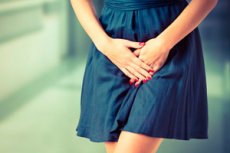Medical expert of the article
New publications
Frequent urges to urinate and pregnancy: causes, signs
Last reviewed: 06.07.2025

All iLive content is medically reviewed or fact checked to ensure as much factual accuracy as possible.
We have strict sourcing guidelines and only link to reputable media sites, academic research institutions and, whenever possible, medically peer reviewed studies. Note that the numbers in parentheses ([1], [2], etc.) are clickable links to these studies.
If you feel that any of our content is inaccurate, out-of-date, or otherwise questionable, please select it and press Ctrl + Enter.

Many obstetricians believe that frequent urination in women is a sign of pregnancy. But this is not always the case, since in some girls it appears in the first months, and in others only towards the end of gestation. That is, dysuric syndrome can occur at any time.
The most common causes of the disorder are:
- Relaxed state of muscle tissue.
- Changes in hormonal levels.
- Changes in metabolic processes in the body.
- Increased stress on the kidneys.
- Increased amount of fluid in the female body.
- Fetal growth.
- Increase in the size of the uterus.
- Formation and renewal of amniotic fluid.
- Pressure of the fetus on the bladder.
In addition to the above reasons, diuresis may be associated with a change in the composition of urine, i.e. its increased acidity. To determine the exact cause of discomfort, you should consult a doctor and take a pregnancy test.
Frequent urination in women and delayed menstruation
One of the first symptoms of pregnancy is frequent urination in women and delayed menstruation. This is observed 2-3 weeks after conception. The urge to go to the toilet to pee is especially pronounced at night, disrupting normal sleep and ending with a small discharge of fluid. Pollakiuria is associated with hormonal changes in the body. But sometimes the unpleasant symptom makes itself known for other reasons, let's consider them:
- Nervous experiences, stress, increased stress on the psycho-emotional state.
- Change of climate, rhythm of life.
- Poor unbalanced nutrition.
- Long-term use of medications.
- Premenstrual syndrome.
- Pre-menopausal period.
- Colds with complications affecting the urinary system.
If the delay in menstruation and the urge to go to the toilet persist for a long period of time, this may be due to the following pathologies:
- Inflammatory lesions of the uterus and its appendages.
- Polycystic ovary syndrome.
- Cystic ovarian lesions.
- Frozen or ectopic pregnancy.
- Venereal diseases.
- Diabetes mellitus or diabetes insipidus.
- Diseases of the genitourinary system.
- Cardiovascular disorders.
To eliminate the painful condition, you should seek medical help and determine the underlying cause of the disorder. Treatment depends entirely on the factors that caused the disorder.
Frequent urination in women during pregnancy
After conception, metabolic changes and disruption of biological reactions occur in the female body. Because of this, the amount of fluid consumed and excreted increases. And sex hormones are also intensively produced. Based on this, frequent urination in women during pregnancy is normal, of course, if it is not accompanied by additional painful symptoms.
- First trimester
The main pregnancy hormone is progesterone. Its increasing amount causes the soft muscles to relax, including the bladder. The desire to go to the toilet is also associated with the increase in the size of the uterus and its displacement.
- Second trimester
During this period, most women do not complain of problems with emptying the bladder. Discomfort most often occurs due to a change in the position of the uterus, which comes out of the pelvic area, rising upward. In some cases, the disorder is associated with infectious lesions and pathologies in the genitourinary tract.
- Third trimester
At this stage, the uterus is still elevated and presses its weight on the bladder. In addition to uncontrolled dysuria, there is pain in the lumbar region, swelling in the legs and arms, and difficulty breathing. These symptoms are associated with changes in the functioning of the kidneys and other organs and systems.
In addition to the above factors, the unpleasant condition may be associated with anemia. Iron deficiency in the body affects the health of the mucous membranes, making them vulnerable and easily irritated. To alleviate and prevent the disorder, you should control the use of diuretic products, avoid wearing tight clothing and visit the toilet in a timely manner, that is, do not retain liquid for a long time.
If pollakiuria during pregnancy is accompanied by itching, burning, the release of blood clots or elevated temperature, then you should immediately seek medical help. Since the symptoms may indicate infectious pathologies or be a sign of an ectopic pregnancy.
Frequent urination in women after childbirth
The joy of motherhood can be overshadowed by various pathological symptoms that prevent you from fully enjoying the appearance of a new family member. Frequent urination in women after childbirth is in most cases associated with functional disorders of the bladder. But sometimes the unpleasant symptom occurs due to the following factors:
- Infection of the genitourinary system during childbirth.
- Inflammatory processes in the body.
- Overstretching of the pelvic floor muscles due to prolonged or rapid labor.
- Childbirth using obstetric forceps.
- Vaginal rupture during pushing.
- Large child.
- Displacement of the uterus and vagina outward.
- Oncological lesions of the genital organs.
- Neurological disorders.
If the painful condition persists for a long period of time, you should seek medical help. The gynecologist will conduct a set of diagnostic studies to determine the cause of the disorder. Based on the diagnosis, the most effective and safe treatment, physiotherapy, and diet will be prescribed.

